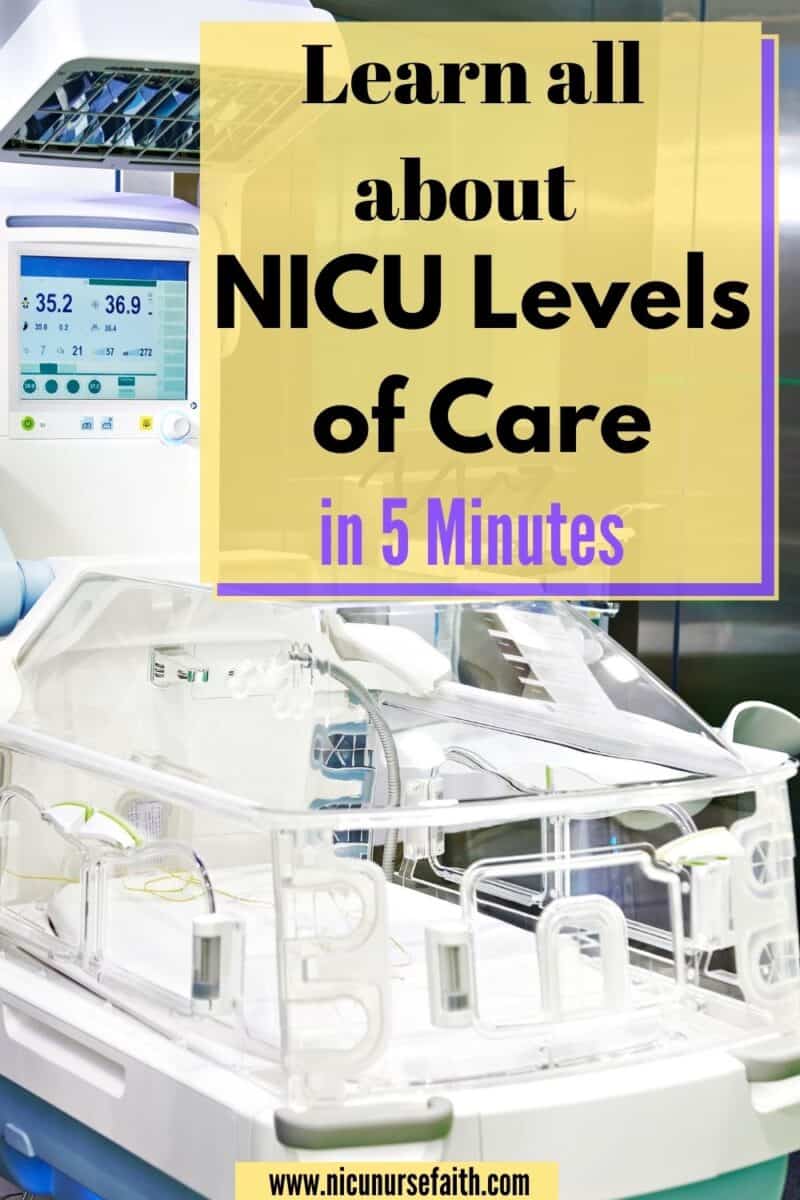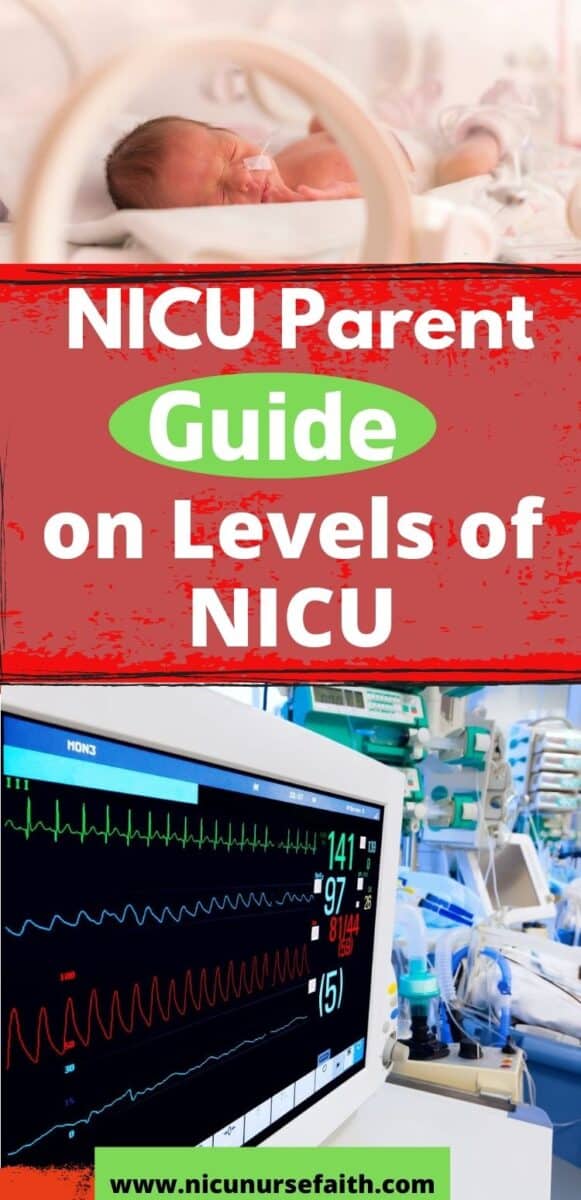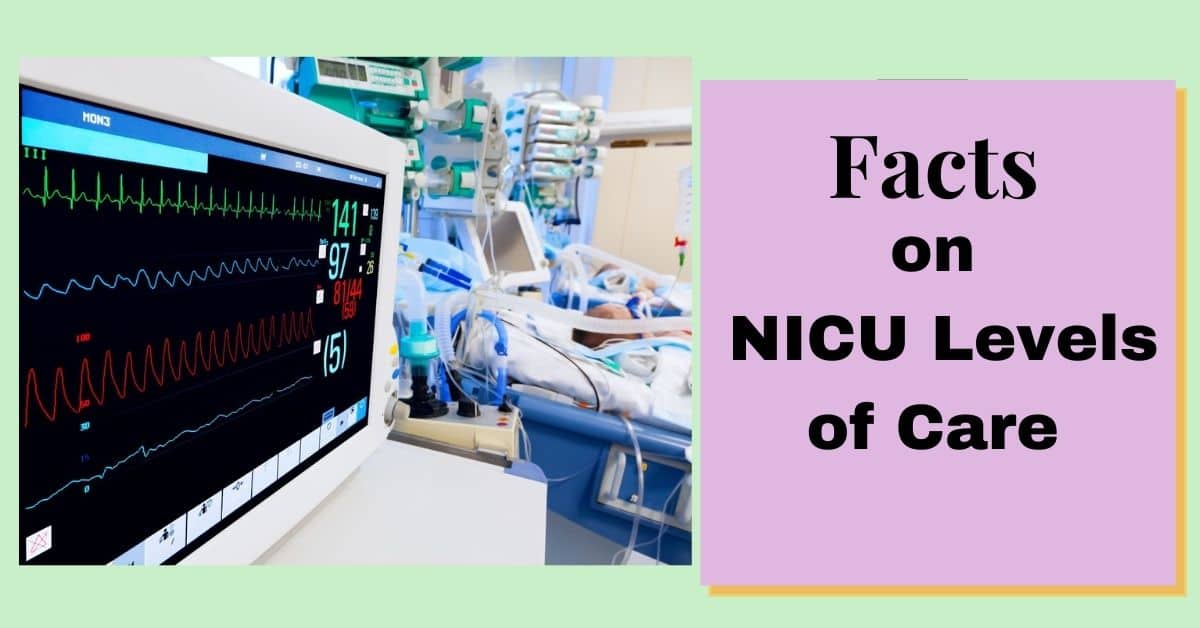Broad Neonatal Care Guidelines for each NICU Level
Wondering what level 2 vs level 3 vs level 4 NICU care is?
Are you wondering what the requirements are for your baby to move from one level to another?
The answer depends on what kind of care your baby needs.
Each NICU levels of care offers different care based on the baby’s condition.
There are specific NICU levels of care criteria that the health care team looks at before moving a baby.
And I will explain what the criteria is for each level.
In the last 7 yrs working as a NICU nurse, I have moved babies up and down all the levels of neonatal care.
I work at a Level 2 and 3 NICU.
And we have a Level 4 NICU across the road.
So I have a pretty solid knowledge on what the criteria is and what your baby has to be doing to move down a level, and eventually go home!
It’s amazing to see a baby born soo small and unstable in Level 3 or 4.
Then they move to level 2 and eventually go home when they are breathing on their own and feeding well.
This amazing positive progression of premature babies reminds us to always have hope!
So keep on reading to learn more about the levels of neonatal care.

NICU Standards of Care
When a premature baby is born, it’s very important that they are born in a hospital that can give them the proper care.
This is because each NICU level of care have specific guidelines and standards of care they can provide.
All NICUs have the training to deliver and stabilize the sickest baby, but eventually this baby has to be transferred to a level 3 or 4.
Therefore, a baby who is born really premature will need care from a facility that has guidelines for proper intubations, inserting central IV lines and specialized trained health care team to care for a micro-preemie.
This is very important because any intervention we do on the baby can have long term effects.
So the broad rule of thumb for the NICU levels of care criteria is: ⇨
- Any baby that is born (premature or full term), and needs surgery will need a Level 4 NICU.
- Any baby born under 32 wks automatically need a Level 3 NICU care.
- A baby born after 32 wks will need a Level 2 NICU.
- Any baby born full term (after 37 wks) and is healthy will go to a Level 1 aka. postpartum unit.

Level 4 NICU Requirements
⇩
This is the highest level of care for the sickest babies.
A level 4 NICU has everything a Level 3 NICU has with the added bonus of surgical doctors, anesthesiologists and other paediatric speciality doctors that the baby and family can see.
CRITERIA:
- A premature baby in Level 3 NICU, who needs surgery OR
- Any full term baby born with a congenital defect that needs surgery OR
- Any baby that needs paediatric speciality doctors (ie. cardio, neuro,) for their care
Level 3 NICU Requirements
⇩
Any baby born under 32 wks will need a Level 3 NICU.
These babies are very unstable!
They need help with breathing through machines via intubation or high pressure CPAP.
Since they are born very small and sick, they will need intense medical interventions such as blood pressure medications to control their blood pressure, blood transfusions, controlling their temp carefully, and specific care practices to decrease the chance of a brain bleed.
CRITERIA:
- born less than 32 wks OR
- a baby of any gestation who is very sick, needs life saving breathing support and is unstable OR
- needs access to paediatric specialty doctors OR
- Advanced test are needed such as as MRI, echocardiography(images of the heart) and can be read by a specialty doctor OR
- any baby that was well, then became sick and needs critical care
Level 2 NICU Requirements
⇩
Level 2 nursery requirements are that these are babies who are born after 32 wks, weigh greater than 1500g, and are usually stable with breathing.
They might need low setting CPAP or oxygen through nasal prongs.
Most of the time they are learning how to eat by mouth and grow… they are also known as “feeders and growers”
CRITERIA:
- born after 32 wks + weight is greater then 1500g
- breathing is stable, might need low setting CPAP or nasal prongs
- learning how to eat by mouth by bottle or breast
Level 1 NICU Requirements
⇩
Most well baby units in Canada are not called a “Level 1 NICU”.
Instead these babies will stay with their mom on the postpartum unit.
On every postpartum unit, there are still emergency, life saving equipments present for any baby who gets sick.
Any of the nurses and doctors are trained to take proper action if a baby gets sick.
Then this baby will be transferred, usually across the hall, to a level 2 or 3 NICU for proper care.
March of Dimes stated that, in the United States, level 1 NICU are for babies born after 35 wks and are stable.
CRITERIA:
- Full term
- healthy

Final Conclusion on NICU Levels of Care Criteria
Most hospitals will have a level 2 NICU, but they might not have a level 3 NICU.
In this case, babies who are born in a Level 2 NICU, but need level 3 care, will be transported by ambulance or helicopter by a specialized transport team.
To avoid this, it’s very important that if you are a high risk pregnant mom or if you went into spontaneous labour with a really premature baby (less than 28 wks), go to a hospital with a Level 3 NICU to give birth!
This will help avoid the moving of the baby from one hospital to another, so the baby can be stabilized faster and a care plan can be created.
What level of care did your baby need when they were first born?
COMMENT BELOW!
If anything on my blog has helped you, please make sure to share the post, comment below the post and subscribe to my email list for more goodies.
I would love to hear from you!
Instagram: @nicunursefaith
Related Articles on NICU Levels of Care Criteria


